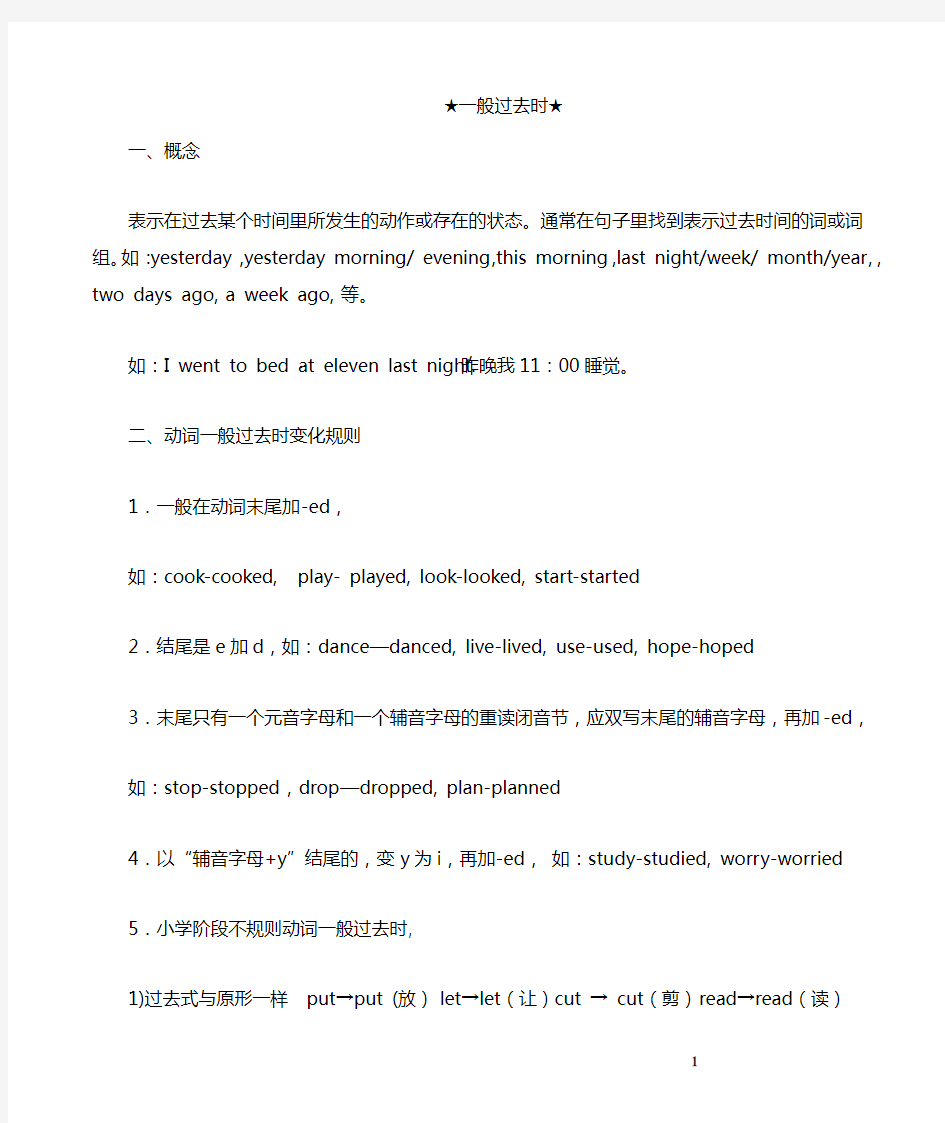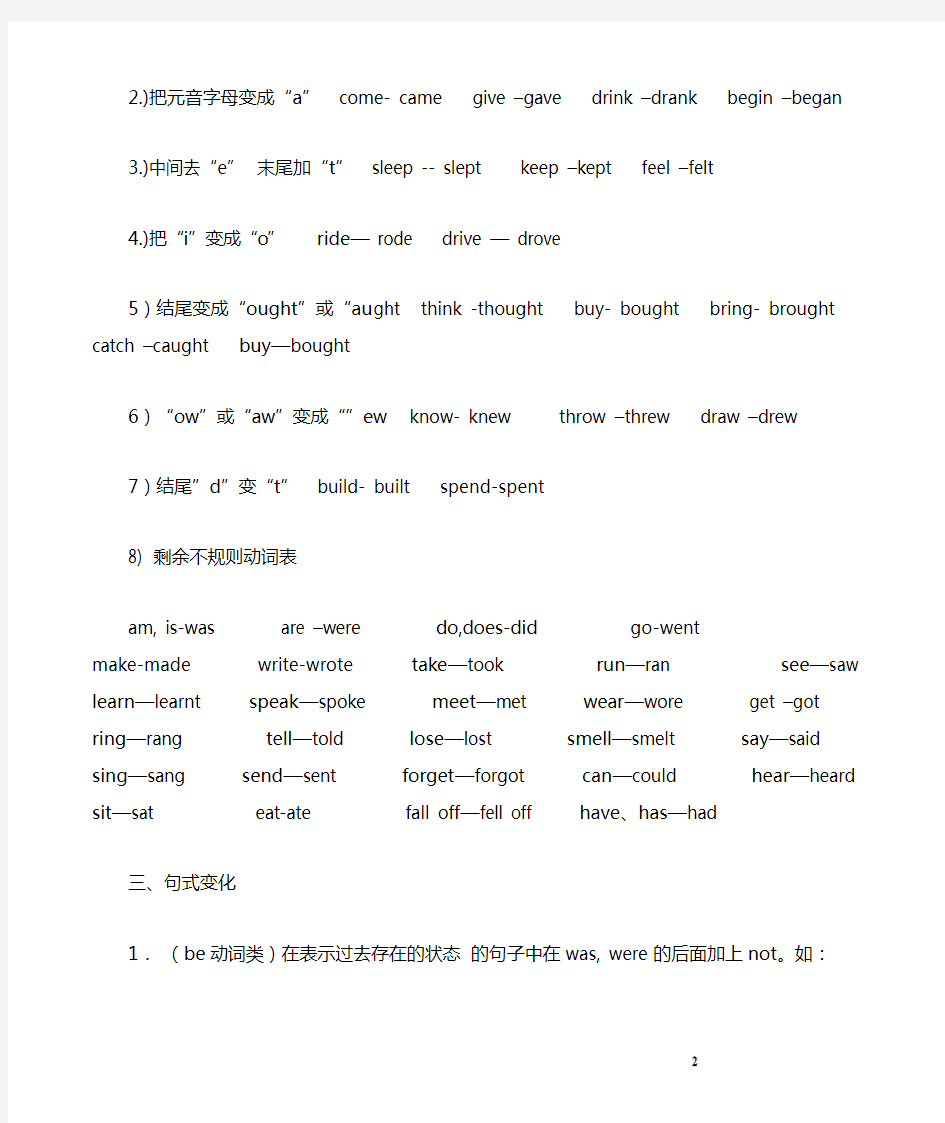

★一般过去时★
一、概念
表示在过去某个时间里所发生的动作或存在的状态。通常在句子里找到表示过去时间的词或词组。如:yesterday,yesterday morning/ evening,this morning,last night/week/ month/year,,two days ago,a week ago,等。
如:I went to bed at eleven last night. 昨晚我11:00睡觉。
二、动词一般过去时变化规则
1.一般在动词末尾加-ed,
如:cook-cooked, play- played, look-looked, start-started
2.结尾是e加d,如:dance—danced, live-lived, use-used, hope-hoped
3.末尾只有一个元音字母和一个辅音字母的重读闭音节,应双写末尾的辅音字母,再加-ed,如:stop-stopped,drop—dropped, plan-planned
4.以“辅音字母+y”结尾的,变y为i,再加-ed,如:study-studied, worry-worried 5.小学阶段不规则动词一般过去时,
1)过去式与原形一样put→put (放)let→let(让)cut → cut(剪)read→read(读)
2.)把元音字母变成“a”come- came give –gave drink –drank begin –began
3.)中间去“e” 末尾加“t”sleep -- slept keep –kept feel –felt
4.)把“i”变成“o” ride— rode drive — drove
5)结尾变成“ought”或“a ught think -thought buy- bought bring- brought catch –caught buy—bought
6)“ow”或“aw”变成“”ew know- knew throw –threw draw –drew
7)结尾”d”变“t”build- built spend-spent
8) 剩余不规则动词表
am, is-was are –were do,does-did go-went
make-made write-wrote take—took run—ran see—saw learn—learnt speak—spoke meet—met wear—wore get –got ring—rang tell—told lose—lost smell—smelt say—said sing—sang send—sent forget—forgot can—could hear—heard sit—sat eat-ate fall off—fell off have、has—had
三、句式变化
1.(be动词类)在表示过去存在的状态的句子中在was, were的后面加上not。如:
肯定句:He was in the park the day before yesterday.
否定句:→He was not in the park the day before yesterday.
肯定句:We were busy last week.
否定句:→We were not busy last week.
2.(行为动词类)要在行为动词的前面加助动词didn’t. 然后把动词过去式改为动词原形。即:didn’t + 动词原形
肯定句:
She played the violin last night.
否定句:→She didn’t play the violin last night.
肯定句:They swam in the lake yesterday.
否定句:→They didn’t swim in the lake yesterday.
3.一般过去时的一般疑问句
1)把was, were放在句首,其余位置不变。He was born in Shanghai.
→ Was he born in Shanghai? (一般疑问句)
→Yes, he was. (肯定回答)
→No, he wasn’t.(否定回答)
They were in Li Yan’s home last night.
→ Were they in Li Yan’s home last night? (一般疑问句)
→Yes, they were. (肯定回答)
→No, they weren’t. (否定回答)
2)句中没有be 动词时,把did 放在句首。
They had a good time in the park.
一般疑问句:Did they have a good time in the park?
肯定/否定回答:Yes, they did. No , they didn’t.
. Ann did her homework yesterday evening.
一般疑问句:Did Ann do her homework yesterday evening?
肯定/否定回答:Yes, she did. No, she didn’t.
I read an English book last week.
一般疑问句:Did you read an English book last week?
肯定/否定回答:Yes, I did. No, I didn’t.
综合练习
一、写出下列动词的一般过去时
is\am________ study_______ drop________ are ________ play_______
go________ does_______ help ________ ask ________ watch ________
eat__________ put ______ read_________ make ________ have________
do ________ has_________ come _________ sit ________ run________ 二、选择题
( ) 1. We ______ an English play a moment ago.
A. see
B. sees
C. saw
( ) 2. Liming ________ last Sunday morning.
A. cut hair
B. cuts hair
C. is cutting
( ) 3. He ________ the clothes yesterday.
A. didn’t wash
B. didn’t washed
C. don’t washed
( ) 4. It ______ a windy day yesterday.
A. is
B. was
C. am
( ) 5. What ______ you usually(经常地)do on the weekend?
A. are
B. do
C. did
( ) 6. He ______ his grandparents last Sunday.
A. visit
B. visited
C. visits
( ) 7. Where did you go _______?
A. tomorrow
B. now
C. just now
( ) 8. – Did you play football? -- Yes. I ________ football.
A. play
B. plays
C. played
( ) 9. __________you__________ to school last Sunday?
A. Did, come
B. Do, come
C. Were, come
( ) 10. ______ he ______ football last weekend?
A. Did, played
B. Did, play
C. Did, plays
三、填空题
?Her father _______ (read) a newspaper last night.
?We _________(go) to the zoo yesterday.
?______ you _______ (visit) your relatives last Spring Festival?
?______ he _______ (fly) a kite on Sunday?
?Yes, he ______.
It ______ (be) Ben’s birthday last Friday.
?We all ______ (have) a good time last night.
?He _________ (live) in Wuxi two years ago.
?The cat ________ (eat) a bird last night.
四、用所给单词的正确形式填空。
It _______(rain) here last Sunday, too. I____ (be) at home all day. I _____(be) very busy. First I _____(do) my homework. Then I ________ (clean) my room. Next I ________(water) the plants. After that, I ________ (write) a letter to Anne. Finally I _______(read) a book about space.
五:分辨时态
一、一般现在时
1. I ______(get) up at 6 every day.
2. He_____________ (not like) apples.
3. ______(be)there any meat on the plate?
4. ______you ______(have) a computer?
5. ______he _____(like) fishing?
6. What______(be) your hobby?
二、一般过去时
1. I _______(get) up at 5 yesterday.
2. He _______(be) at home yesterday.
3. Yesterday it______(rain). I__________(not go) out and play. I ______(feel) very sad
I ______(stay) inside all day.
4. ______you______(water) the flowers yesterday?
5. What______he _____(do) yesterday evening?
三.一般将来时
1. I ___________(write) you a letter next week.
2. What______I ______(do)?
3. There________________/__________(be) a sports meet soon.
4. We_____________(go) there by bus next Monday morning.
5 .They ______________(fly) to Wuhan tomorrow.
6. Uncle Wang_______________(come) to supper this evening .
四.现在进行时
1. Listen! The baby ____________(cry)
2. The students ______________(listen) to the teacher.
3. Don’t speak loudly. The baby___________(sleep).
4. Look.The girls____________(dance) under the tree.
5. What’s your mother doing now? She_______(cook) in the kitchen.
6. ______your brother__________(watch)TV now?